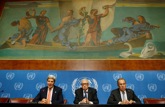Syria: The quintessence of crises

Syria is the quintessence of many past crises. Source: Getty images / Fotobank
After a stunning turnaround in the entire Syrian story, Russia, squarely labelled as the main obstacle to a settlement, has suddenly offered an initiative that might possibly keep the military force whirlpool at bay. Why would Moscow suddenly become a source of constructive proposals instead of a permanent “no”?
Russian Foreign Minister Sergei Lavrov uttered a key phrase at a press conference in the summer of 2012: “The way the Syrian crisis is resolved will largely determine the model for the international community’s response to internal conflicts in the future.” That is precisely what has defined Moscow’s behaviour with regard to the Syrian fratricide.
Turmoil in Syria started literally when the UN Security Council was adopting Resolution 1973, which sanctioned outside interference in the civil war in Libya. As we know, Russia decided at the time not to oppose the creation of no-fly zones to protect civilians. The hastily passed document, which was worded rather vaguely, unlike the UNSC’s habitual succinct legalese, has essentially become grounds for massive foreign participation in an internal conflict and a regime change.
The position on Syria is a derivative of Libya. First of all, there is resentment and irritation at the West that “has cheated.” Secondy, there is a deep conviction that flexibility and the “maybe” language might subsequently be interpreted as a sanction for violence in favour of one of the sides, with the consent of the “international community,” which, according to the West, is a basis for “the model for response to internal conflicts in the future.”
As the situation in Syria has deteriorated, Russia and China have consistently rejected any draft resolutions assigning the blame or containing automatic sanctions: if Damascus fails to do this or that, such and such measures up to and including military action will be taken. The goal was not to legitimise a repeat of the Libyan model.
Since the situation in Syria’s civil war was becoming increasingly complicated, diplomatic efforts gradually reached an impasse; Russia was viewing intervention as an increasingly destructive enterprise, whereas the West was reluctant to intervene while realising, at the same time, that the rebels would otherwise have no chance of turning the war around in their favour.
The use of toxic substances made external intervention inevitable. Obama was instantly reminded of his “red line” warnings and that “Assad had to go,” so making good on his promises became a matter of honour. What Moscow had been trying to avoid for more than two years started approaching fast. Almost nobody in Moscow had ever doubted that intervention would resolve none of Syria’s problems and would only make things worse. Yet, from the perspective of Russia’s prestige, a war would be an extremely unpleasant development: all points it had earned thanks to its consistent line would have been cancelled.
Related:

Landmark U.S.-Russia deal on Syria a 'diplomatic victory'
The idea of putting chemical weapons under international control is, among other things, a chance to capitalise on all that has been achieved to date. So there is no charity involved, just looking after one’s own interests before anything else.
The world has recognised, largely with resentment, that Russia had hit the bull’s eye: the plan it proposed allows many a face to be saved while offering an elegant way out of the impasse. That said, the struggle for a diplomatic victory is only just beginning.
First of all, the operation to transfer control of chemical weapons is an extremely challenging endeavour in the calmest of times. Coordination between nations and international organisations is needed, as is trust among those involved, this currently being sorely lacking.
Second, there is a party that clearly stands to lose: the Syrian opposition, for which a delay or abort of a military strike against Assad would mean the end of any hopes it had of a turnaround in the war. The rebels in general cannot like the fact that of all things Syrian, a subject that was not even at the origin of the problem, have suddenly moved to centre stage.
Third, the US administration is under pressure to deliver a quick result. A fear of being viewed as incapable of acting is pushing Obama towards impulsive reactions.
Fourth, a very clearly and professionally worded UN Security Council resolution is required and this is something that needs to be accomplished within days. The key pitfall here is the automatic sanctions that Russia has been opposing all along. The first draft proposed by France was worded as an ultimatum to Assad, something that neither Moscow nor Beijing will accept. The West sincerely believes in the need to draw yet another “red line,” without which Damascus, in their opinion, will continue to mislead the international community. Russia, on the other hand, is concerned not to get in a situation where any delays in implementation of the plan would be immediately interpreted as grounds for retaliation.
The previous campaigns in Yugoslavia, Iraq and Libya have taught us a lot, including the snags that efforts to settle such crises might hit or how problems can be turned inside out to achieve the desired results.
In a way, Syria is the quintessence of many past crises. Success or failure of the plan to eliminate Syrian chemical weapons will show whether the international community is able to learn from its mistakes or can only repeat them and commit new, increasingly fatal ones. The matter of “the model for settling future conflicts” is actually being decided right now.
First published in Russian in Gazeta.ru.
All rights reserved by Rossiyskaya Gazeta.
Subscribe
to our newsletter!
Get the week's best stories straight to your inbox

